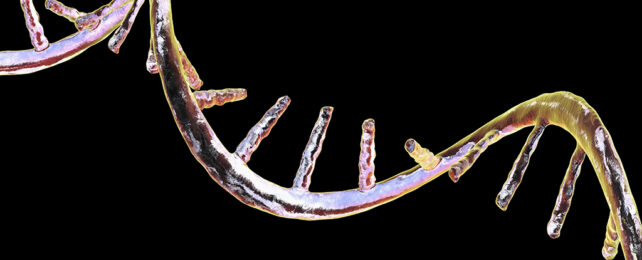ARTICLE AD
 RNA analysis was key to the research. (Kateryna Kon/Science Photo Library/Getty Images)
RNA analysis was key to the research. (Kateryna Kon/Science Photo Library/Getty Images)
Mutations in the gene TET2 have been previously linked with cancer. Now scientists may have solved the persistent mystery of why this link exists, and that means a set of new targets for cancer treatments.
A research team in the US started looking in an alternative place for answers, switching their attention from DNA to RNA (which helps carry out DNA's genetic instructions and produce proteins).
It turns out that TET2 has considerable influence over an RNA process called methylation, which affects how DNA gets packaged into blocks called chromatin. Cancer can start when missteps happen in this part of the 'incredibly complicated dance' of protein wrapping and unwrapping inside our cells.
"This represents a conceptual breakthrough," says biochemist Chuan He from the University of Chicago.
"Not only does it offer targets for therapy for several diseases, but we are adding to the grand picture of chromatin regulation in biology. We hope the real-world impact is going to be very high."
Mutations in TET2-related genes appear in up to 60 percent of leukemia cases, and they've been associated with other cancer types too.
Building on previous work looking at how DNA and RNA combine to build proteins through gene expression, the researchers used a variety of advanced gene editing and analysis techniques in the lab to look at the relationship between TET2 and RNA methylation.
The team identified a modification on RNA called m5C, attracting a protein called MBD6, which then controls how chromatin is packaged up.
Early in life, TET2 helps developing cells by making chromatin more accessible, supporting the expression of genes so stem cells can become other types of cells. In adults, TET2 tightens control by limiting MBD6. If that control is lost, the biological production line can start to go haywire.
"If you have a TET2 mutation, you reopen this growth pathway that could eventually lead to cancer – especially in the blood and brain, because this pathway looks to be most important in blood and brain development," explains He.
Further lab tests showed that when MBD6 was blocked, leukemia cancer cells were killed off. This gives experts a new target for cancer-fighting drugs. Developing treatments with the same effect will have enormous potential.
"What we hope we can get from this is a silver bullet to selectively get rid of just cancer cells, by targeting this specific pathway," says He.
In older people, these TET2 mutations have also been linked with a higher risk of inflammatory conditions such as heart disease, stroke, and diabetes.
This is because blood cells with TET2 mutations become inflammatory, putting more strain on different areas of the body. Treatments resulting from this research could also be used as a preventative measure for these conditions.
"Right now, I cannot prescribe anything to these patients because they don't have cancer yet, but if we could eliminate those mutant cells, we could improve their lives," says oncologist Caner Saygin from the University of Chicago.
The research has been published in Nature.

 1 month ago
14
1 month ago
14 

